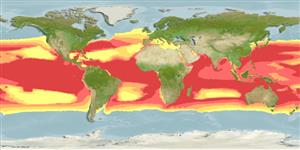Preferred temperature (Ref.
115969): 18.2 - 27.6, mean 24.7 (based on 46871 cells).
Phylogenetic diversity index (Ref.
82804): PD
50 = 1.0000 [Uniqueness, from 0.5 = low to 2.0 = high].
Bayesian length-weight: a=0.00282 (0.00202 - 0.00393), b=3.17 (3.07 - 3.27), in cm Total Length, based on LWR estimates for this species (Ref.
93245).
Trophic level (Ref.
69278): 4.3 ±0.2 se; based on diet studies.
устойчивость к внешним воздействиям (Ref.
120179): средний (среднего размера), минимальное время удвоения популяции 1.4-4.4 года (K=0.34; tm=1-2 y; tmax >4; Fec=6 million).
Prior r = 0.84, 95% CL = 0.55 - 1.26, Based on 1 full stock assessment.
Fishing Vulnerability (Ref.
59153): Moderate to high vulnerability (46 of 100).
Climate Vulnerability (Ref.
125649): Very high vulnerability (76 of 100).
